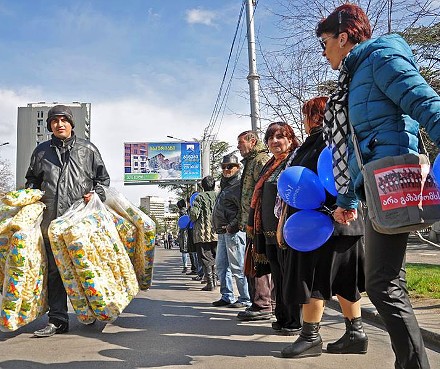TBILISI, DFWatch–Several thousand people joined the National Movement on Sunday in a protest against the Georgian government’s negotiations with Gazprom.
People formed a 7 km long human chain from the government office to the former Russian embassy in Saburtalo, in the west of the capital.
The day before, the government said it has reached an agreement with Azerbaijan’s state oil company Socar about supplies of an additional amount of natural gas, but that was not enough to calm its critics in UNM who distrust the Socar deal and claim that even negotiating with Gazprom is against the national interests of Georgia.
The human chain stretched from Rustaveli Avenue in the center to the old Russian embassy building on Chavchavadze Avenue. Some of the demonstrators held large Ukrainian flags, others Georgian and EU flags. Some of the slogans were also against Georgian Dream, the coalition currently in government.
“We don’t want to depend on Russia in any form, even if it will be natural gas or anything else,” Guram, of about 25, told DF Watch.
In front of the area of Vake Park there were people from Gardabani, a settlement near the capital inhabited with ethnic Azeri population. Most of them were very excited to be there, asking us to take their picture.
“We came here because we don’t like this government,” one of the boys said.
“Yes, and because previous government was much better,” his friend added.
On the other side of the streets could be met people dissatisfied with the previous government obviously disapproving Sunday’s protest.
“God, don’t let those scams come back to force. You fools,” an old man behind me said in a low voice.
The protest ended outside the government office with balloons launched into the sky. Protesters called on the government to end its negotiations with Gazprom, a Russian state-owned company which currently supplies about 13 percent of Georgia’s gas consumption. March 4, Georgia signed an agreement with Socar to import 500 million cubic meters of natural gas, which means that Georgia won’t require additional imports from other sources.
Georgia has been in negotiations with Gazprom over the last year to increase its import of gas and monetize 10 percent of the Russian gas that is transited to Armenia.
March 5, Energy Minister Kakhi Kaladze said that negotiations with Gazprom about this issue are over. But negotiations continue about an agreement to transit gas to Armenia through Georgia.
Defense Minister Tina Khidasheli said Sunday that the National Movement protest amounted to ‘kicking in an open door’ and that there is nothing happening in the country which would require holding a protest.






Leave A Comment
You must be logged in to post a comment.